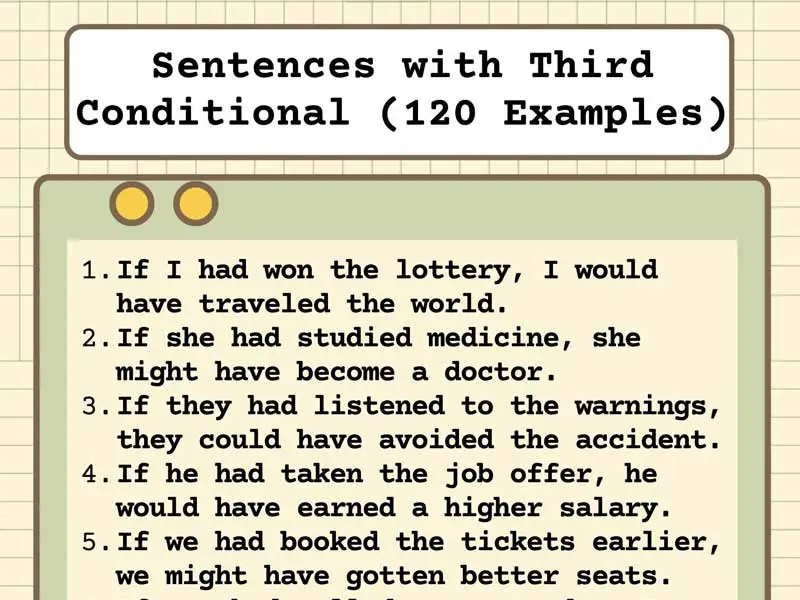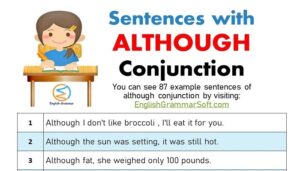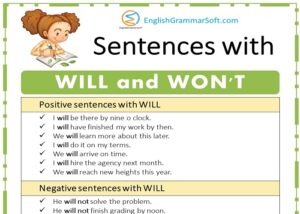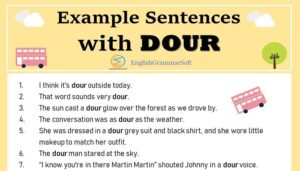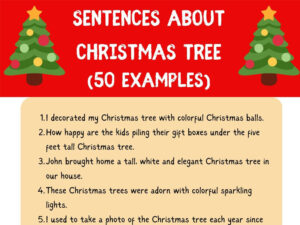Sentences with Third Conditional (120 Examples)
Effective communication is the cornerstone of human interaction, allowing us to express our thoughts, ideas, and emotions. In the vast realm of language, various grammatical structures enable us to convey complex meanings. One such structure is the third conditional sentence. Often overlooked, third conditional sentences provide a powerful tool for expressing hypothetical situations and their imagined outcomes. In this article, we will explore the concept of third conditional sentences, delve into their usage, and provide a comprehensive list of 120 unique examples to enrich your understanding.
What are Sentences with Third Conditional?
Third conditional sentences are a type of conditional sentence that express hypothetical or unreal situations in the past. These sentences consist of two clauses: the “if” clause, which presents the condition, and the main clause, which presents the result. The structure follows the pattern: “If + past perfect, would/could/might + have + past participle.” The past perfect tense in the “if” clause signifies an event that did not occur in reality, while the modal verb and the past participle in the main clause express the consequence of the hypothetical condition.
120 Unique Sentences with Third Conditional
- If I had won the lottery, I would have traveled the world.
- If she had studied medicine, she might have become a doctor.
- If they had listened to the warnings, they could have avoided the accident.
- If he had taken the job offer, he would have earned a higher salary.
- If we had booked the tickets earlier, we might have gotten better seats.
- If you had called me yesterday, I would have joined you for dinner.
- If it hadn’t snowed, we could have gone hiking.
- If they had studied harder, they would have passed the exam.
- If she had saved money, she might have bought a car.
- If we had left on time, we could have caught the train.
- If he had practiced more, he would have performed better in the concert.
- If you had told me the truth, I would have understood.
- If it hadn’t been so hot, we could have enjoyed the picnic.
- If they had won the match, they would have advanced to the finals.
- If she had arrived earlier, she might have met the author.
- If we had chosen a different route, we could have avoided the traffic.
- If he had read the instructions, he would have assembled the furniture correctly.
- If you had listened to my advice, you might have avoided the problem.
- If it hadn’t been a holiday, we could have visited the museum.
- If they had taken the earlier flight, they would have arrived on time.
- If she had practiced more, she might have won the competition.
- If we had finished the project earlier, we could have taken a break.
- If he had paid attention, he would have understood the concept.
- If you had invited me, I would have attended the party.
- If it hadn’t rained, we could have gone to the beach.
- If they had studied abroad, they would have experienced different cultures.
- If she had listened to the news, she might have known about the event.
- If we had chosen a different restaurant, we could have had better food.
- If he had taken the advice seriously, he would have succeeded.
- If you had called the plumber, the pipe wouldn’t have burst.
- If it hadn’t been so crowded, we could have found parking easily.
- If they had bought the tickets in advance, they would have saved money.
- If she had woken up earlier, she might have caught the sunrise.
- If we had practiced more, we could have performed flawlessly.
- If he had asked for directions, he would have reached the destination.
- If you had followed the recipe, the dish would have turned out delicious.
- If it hadn’t been so noisy, we could have concentrated on our work.
- If they had taken the shortcut, they would have arrived sooner.
- If she had studied art, she might have become a painter.
- If we had won the match, we could have celebrated the victory.
- If he had taken the umbrella, he wouldn’t have gotten wet.
- If you had called earlier, I would have picked up the phone.
- If it hadn’t been so late, we could have watched the movie.
- If they had planted the seeds earlier, they would have seen the flowers bloom.
- If we had bought the tickets online, we could have skipped the long queue.
- If he had attended the meeting, he would have known about the new project.
- If you had checked the weather forecast, we wouldn’t have been caught in the storm.
- If it hadn’t been so cold, we could have gone for a swim.
- If they had chosen a different hotel, they would have had a more comfortable stay.
- If she had taken the train, she might have arrived earlier.
- If we had finished the assignment, we could have enjoyed the weekend.
- If he had remembered the appointment, he would have been on time.
- If you had bought the ingredients, we could have cooked together.
- If it hadn’t been a holiday, we could have visited the amusement park.
- If they had won the lottery, they would have bought a mansion.
- If she had accepted the job offer, she might have lived abroad.
- If we had gone to the party, we could have met interesting people.
- If he had followed the instructions, he would have assembled the toy correctly.
- If you had taken the medicine, you wouldn’t have gotten sick.
- If it hadn’t been so foggy, we could have enjoyed the scenic view.
- If they had practiced more, they would have performed better in the play.
- If she had taken the bus, she might have avoided the traffic jam.
- If we had studied the map, we could have found the shortcut.
- If he had apologized, she would have forgiven him.
- If you had set the alarm, we wouldn’t have overslept.
- If it hadn’t been so windy, we could have flown kites.
- If they had finished their homework, they would have gone to the party.
- If she had arrived on time, she might have met the director.
- If we had chosen a different menu, we could have tried new dishes.
- If he had listened to his parents, he would have made better decisions.
- If you had taken the right turn, we wouldn’t have gotten lost.
- If it hadn’t been so expensive, we could have bought the gadget.
- If they had invited us, we would have attended the wedding.
- If she had practiced the song, she might have sung it perfectly.
- If we had finished the chores, we could have relaxed in the evening.
- If he had taken the opportunity, he would have advanced in his career.
- If you had called the mechanic, the car wouldn’t have broken down.
- If it hadn’t been so crowded, we could have danced at the concert.
- If they had booked the hotel earlier, they would have gotten a discount.
- If she had learned the language, she might have communicated with the locals.
- If we had won the championship, we could have celebrated with a parade.
- If he had brought his umbrella, he wouldn’t have gotten soaked.
- If you had informed us, we would have made arrangements.
- If it hadn’t been so hot, we could have gone for a hike.
- If they had studied the subject, they would have understood the topic.
- If she had taken the opportunity, she might have excelled in her career.
- If we had visited earlier, we could have met our old friends.
- If he had taken the risk, he would have experienced great success.
- If you had attended the concert, you would have heard their new songs.
- If it hadn’t been so noisy, we could have had a peaceful conversation.
- If they had arrived on time, they would have witnessed the opening ceremony.
- If she had practiced yoga, she might have improved her flexibility.
- If we had finished our shopping earlier, we could have avoided the crowds.
- If he had asked for help, he would have completed the task quicker.
- If you had followed the recipe precisely, the cake wouldn’t have burned.
- If it hadn’t been so rainy, we could have had a picnic in the park.
- If they had taken the initiative, they would have resolved the conflict.
- If she had attended the workshop, she might have gained new skills.
- If we had bought the tickets, we could have attended the concert.
- If he had practiced his speech, he would have delivered it confidently.
- If you had taken the alternate route, we wouldn’t have encountered traffic.
- If it hadn’t been so dark, we could have gone for a night walk.
- If they had made reservations, they would have secured a table at the restaurant.
- If she had read the instructions, she might have assembled the furniture correctly.
- If we had watered the plants regularly, they could have thrived.
- If he had listened to the advice, he would have avoided the mistake.
- If you had packed your umbrella, we wouldn’t have gotten wet in the rain.
- If it hadn’t been so hot, we could have enjoyed the outdoor event.
- If they had taken the job, they would have had more financial stability.
- If she had bought the ticket, she might have attended the theater play.
- If we had taken the earlier flight, we could have arrived on time.
- If he had studied abroad, he would have experienced a different culture.
- If you had submitted the application, we wouldn’t have missed the deadline.
- If it hadn’t been so crowded, we could have found a parking spot.
- If they had completed the project, they would have received praise.
- If she had tried harder, she might have passed the driving test.
- If we had gone to the party, we could have met interesting people.
- If he had paid attention, he would have understood the lecture.
- If you had called earlier, I would have picked up the phone.
- If it hadn’t been so late, we could have watched the movie.
Printable Examples:
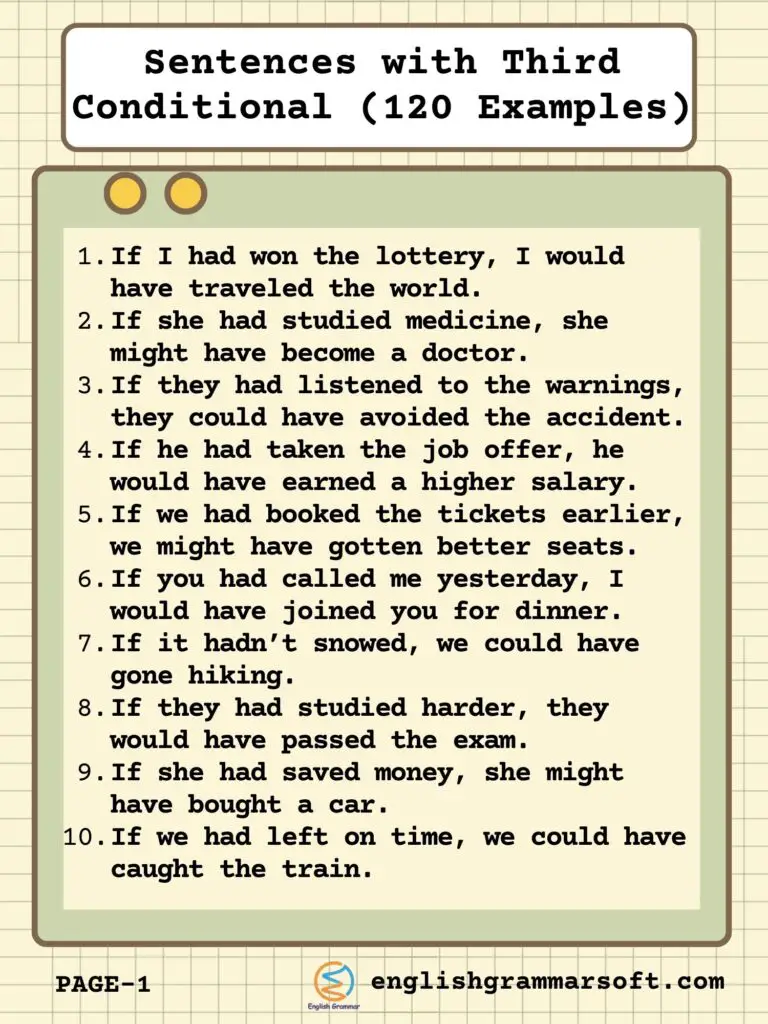
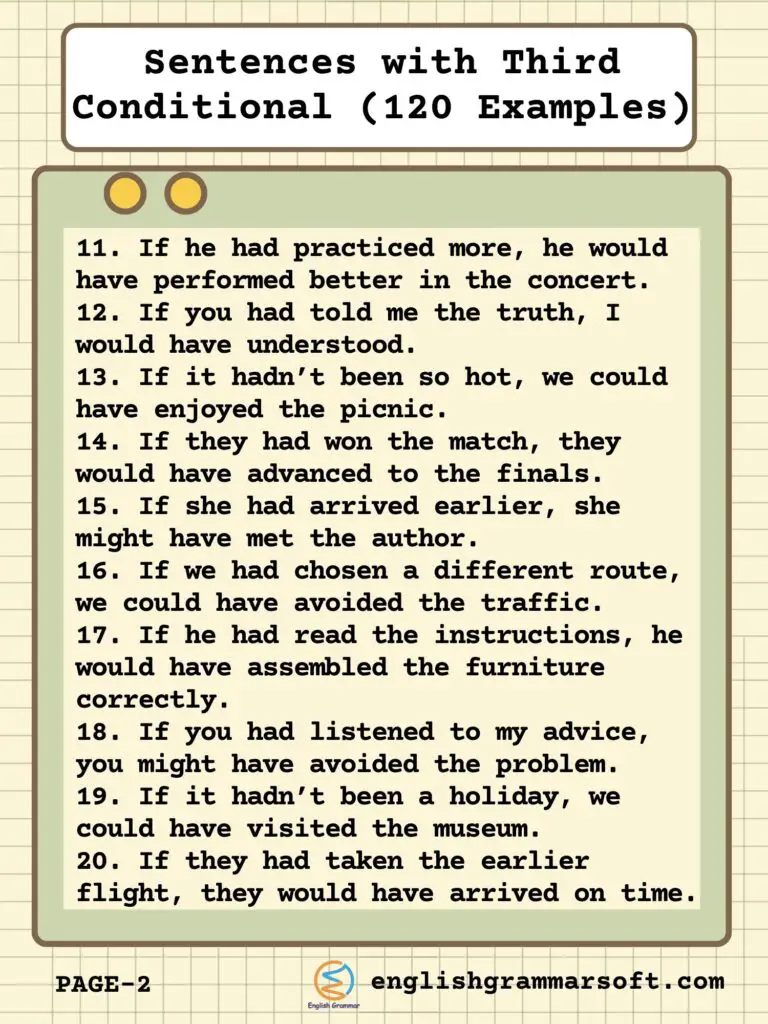
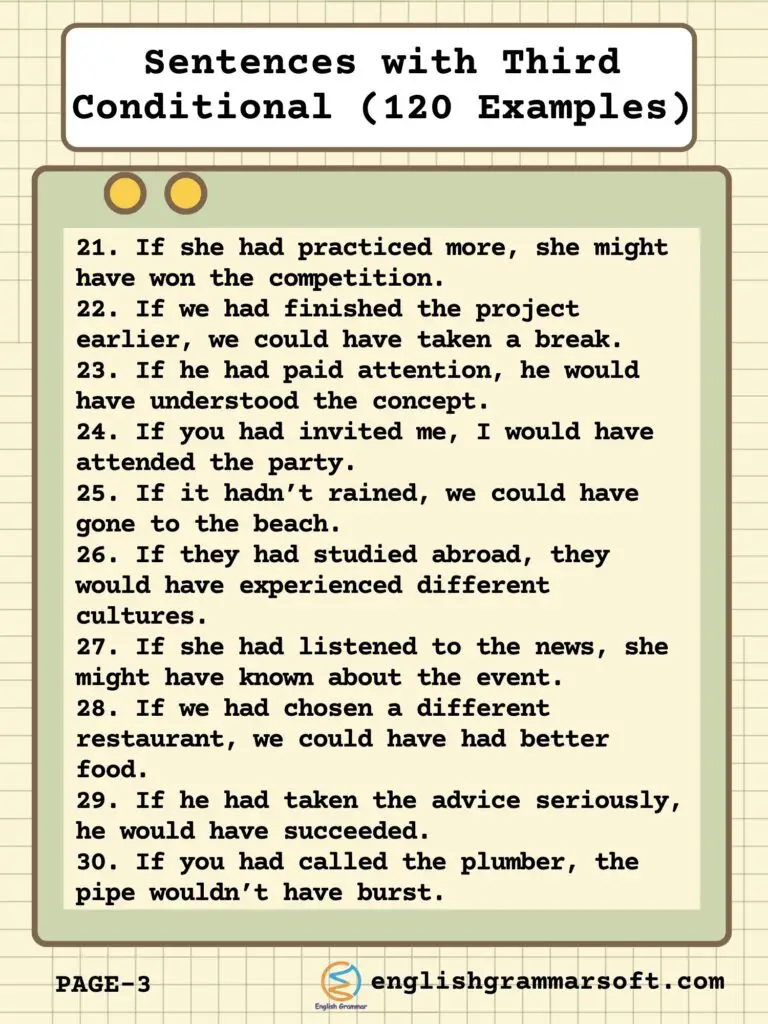
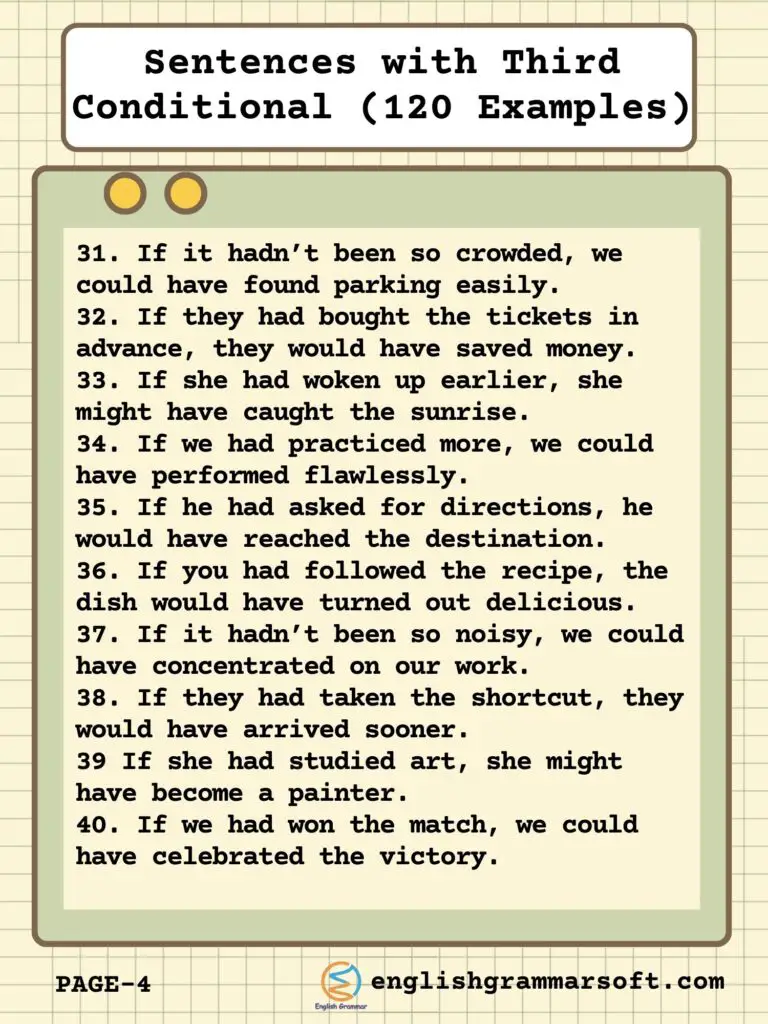
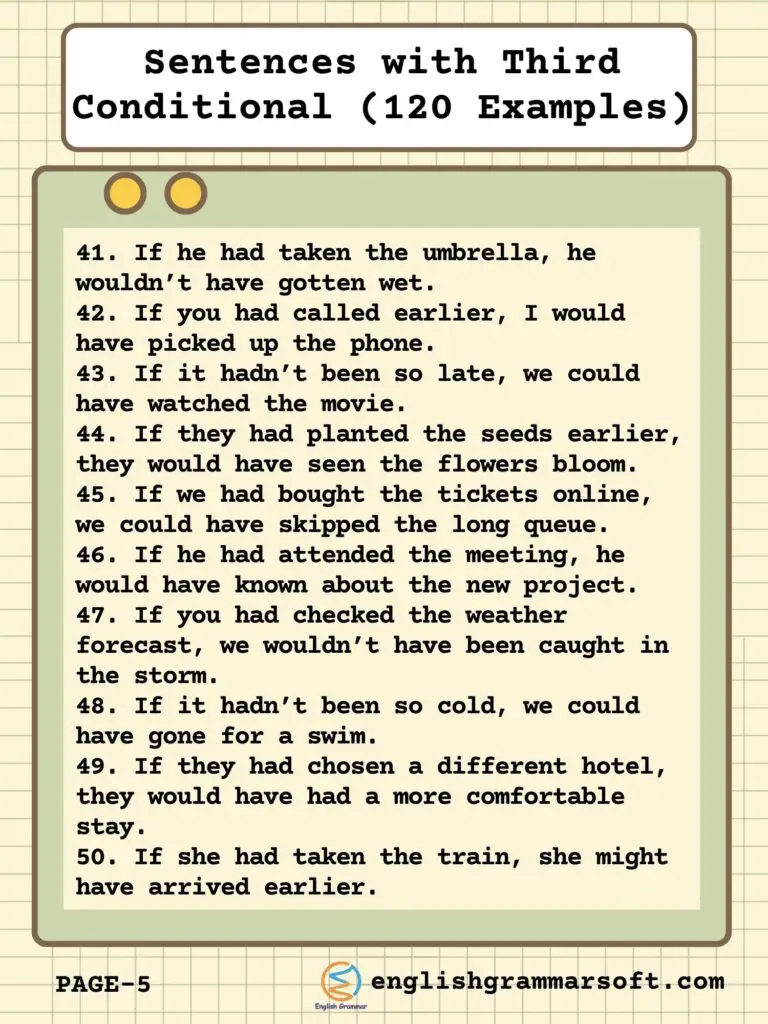
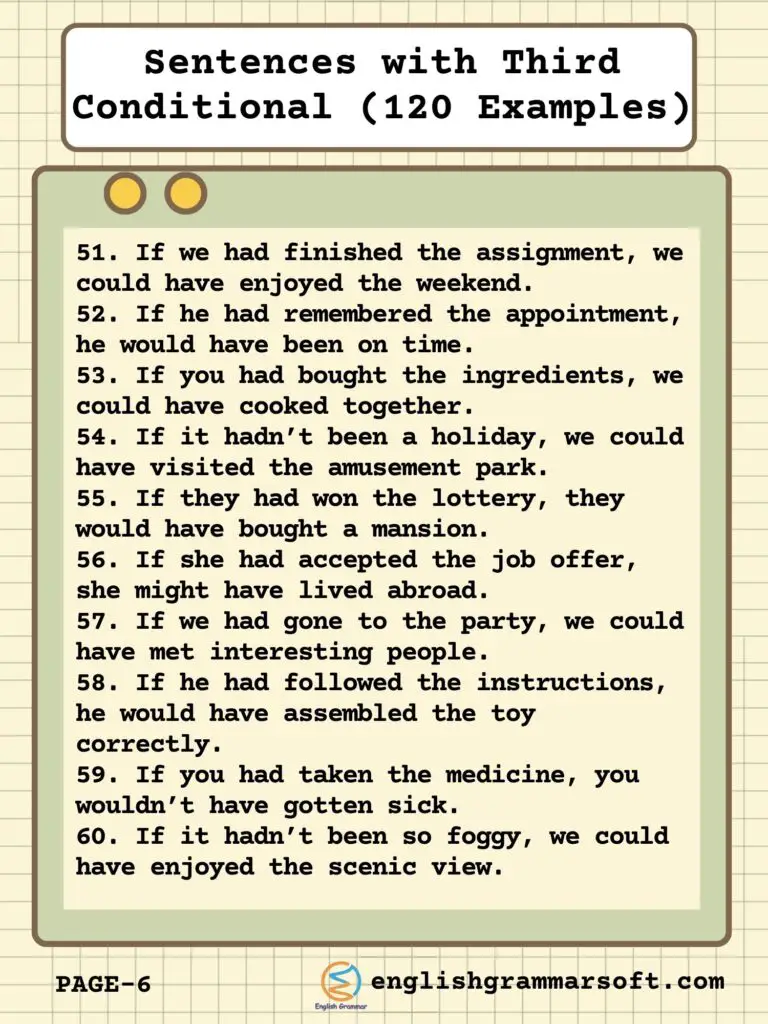
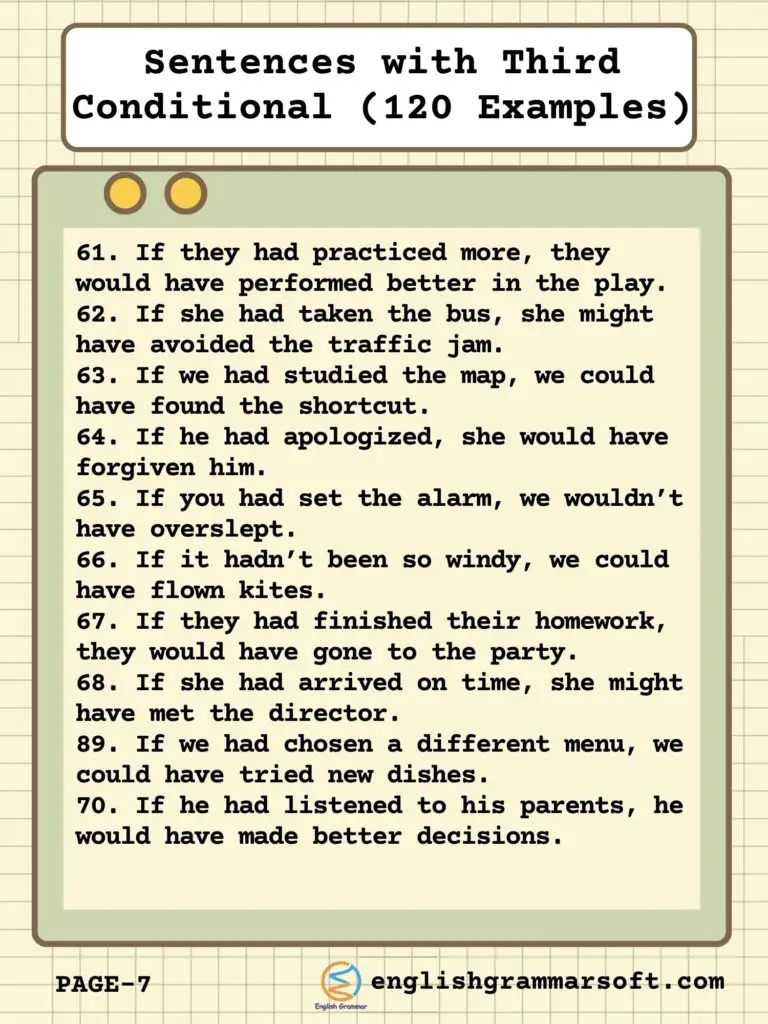
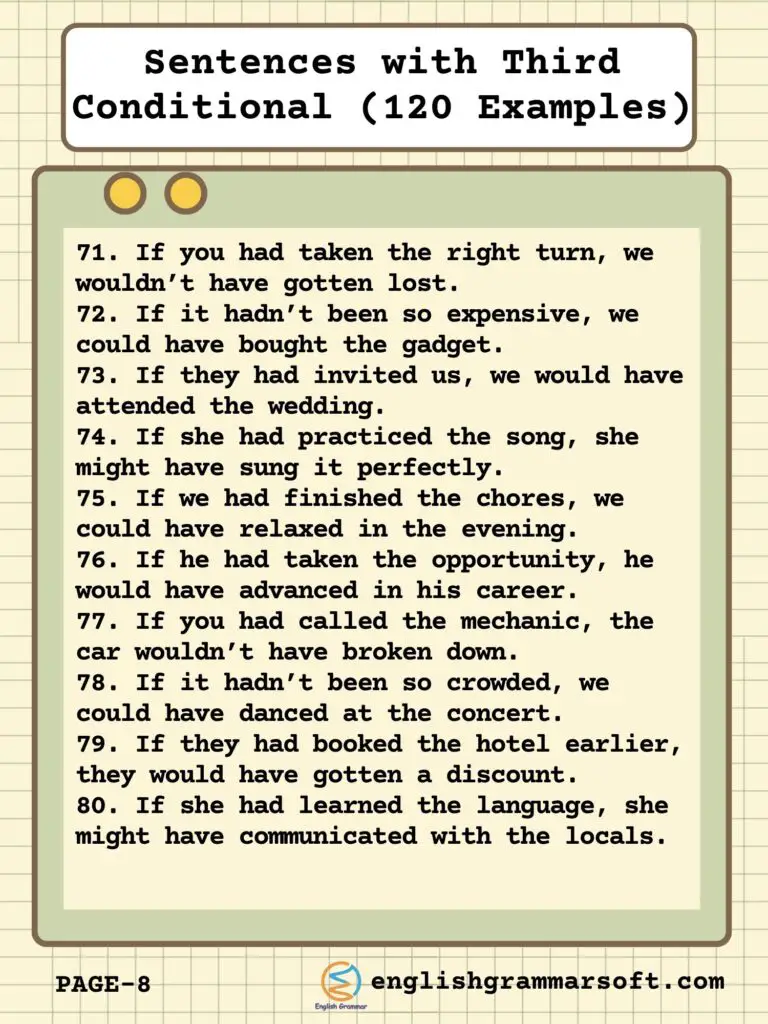
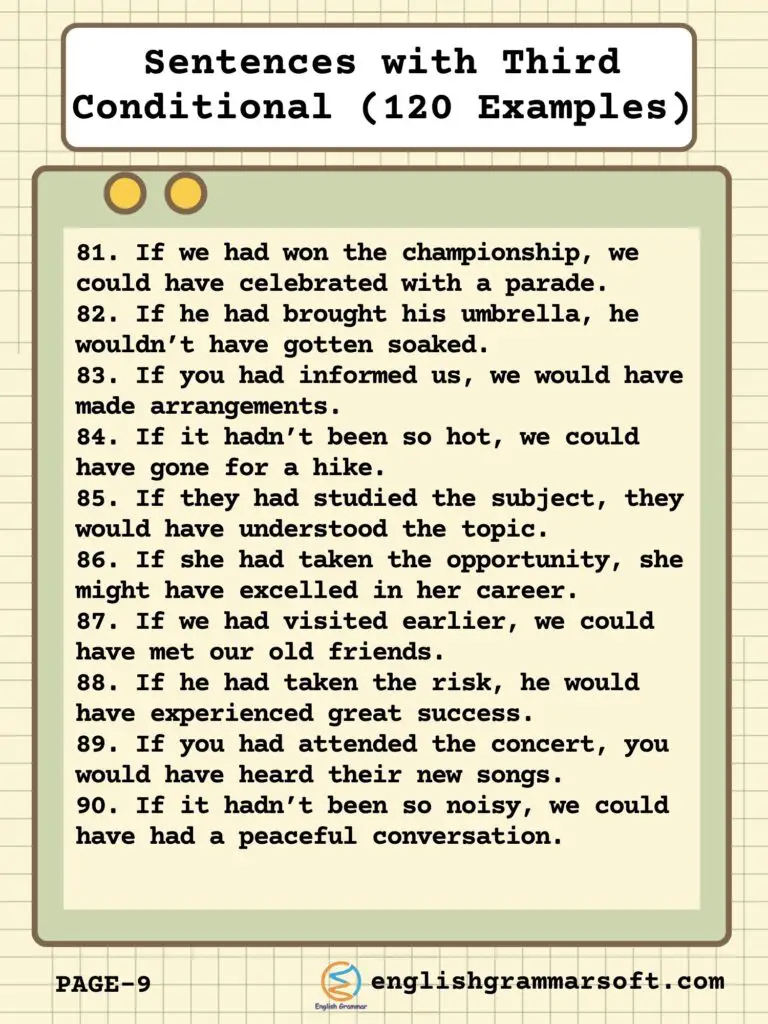
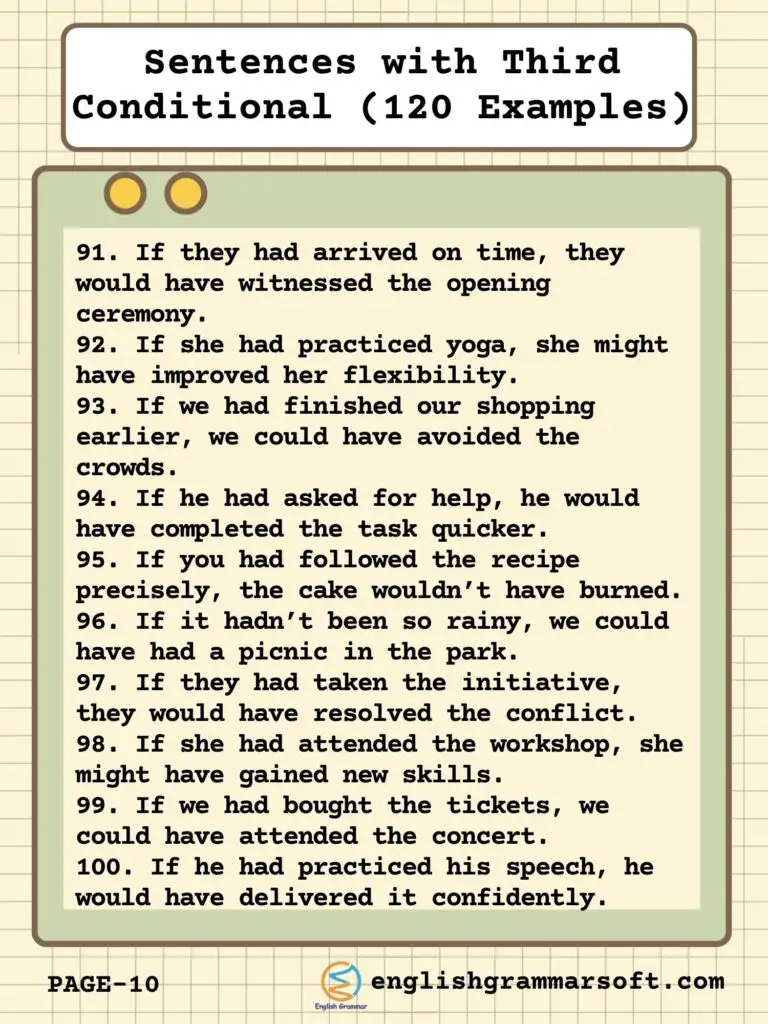
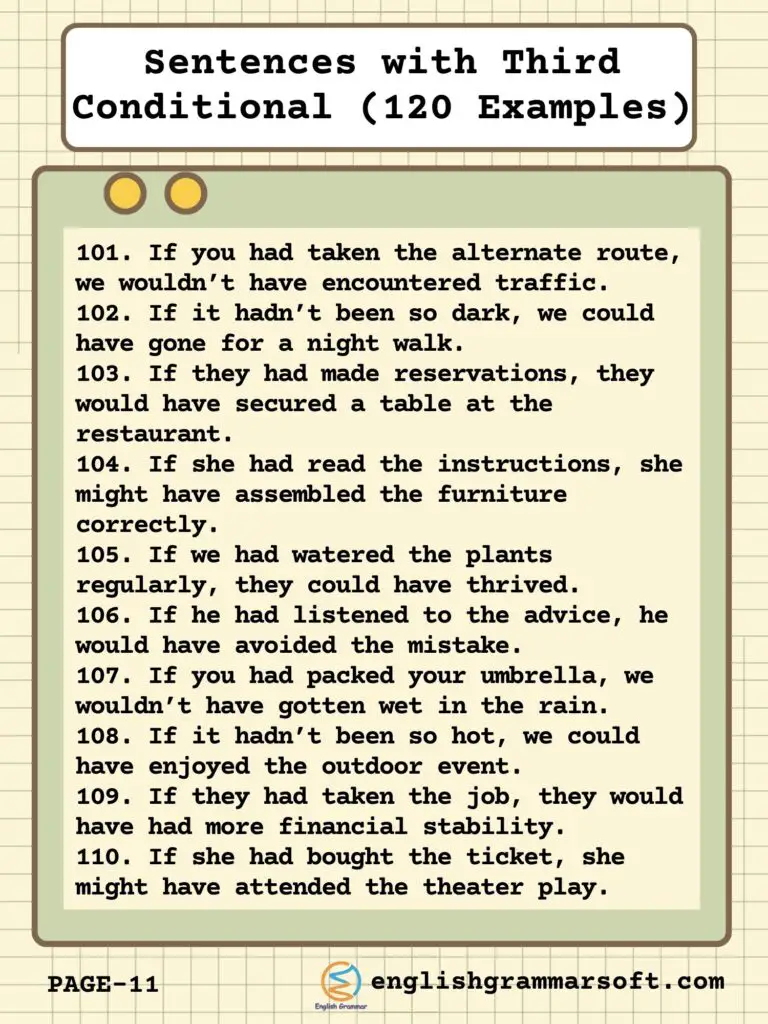
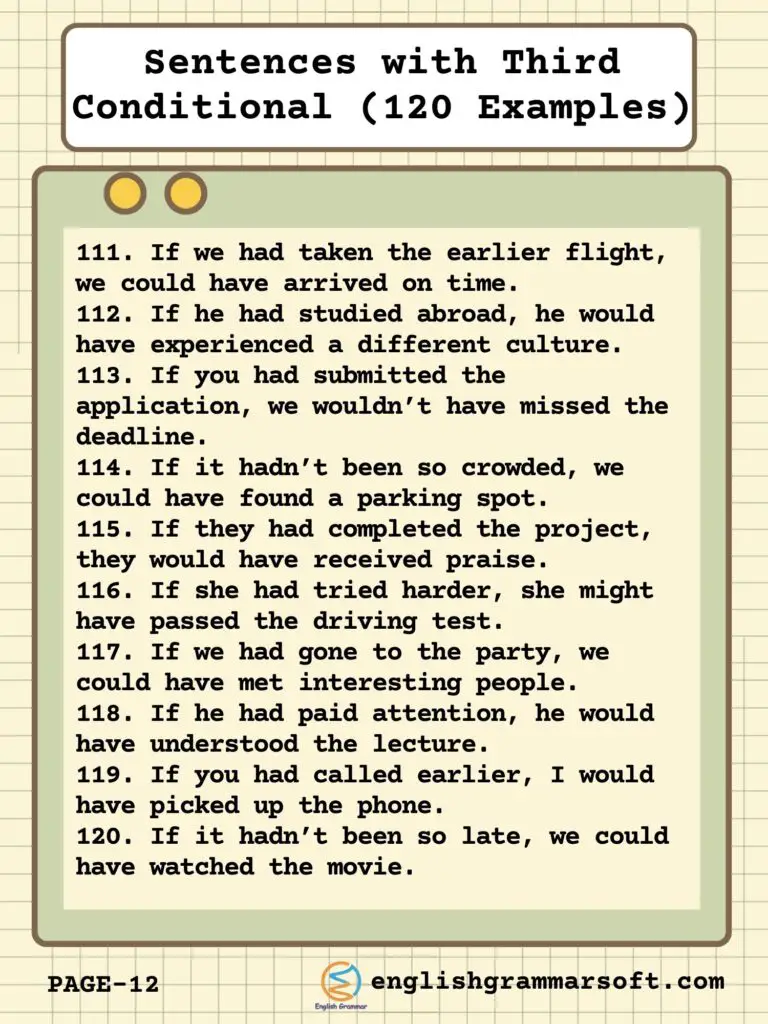
Conclusion
Third conditional sentences offer us a linguistic avenue to explore hypothetical scenarios and their potential outcomes. By mastering this grammatical structure, we gain the ability to discuss alternative past events, analyze their possible consequences, and express regret or satisfaction. The 120 unique examples provided in this article serve as a valuable resource to expand your knowledge and proficiency in using third conditional sentences. As you incorporate these structures into your language skills, you will unlock new dimensions of expression, fostering clearer communication and deeper understanding in your interactions with others.
